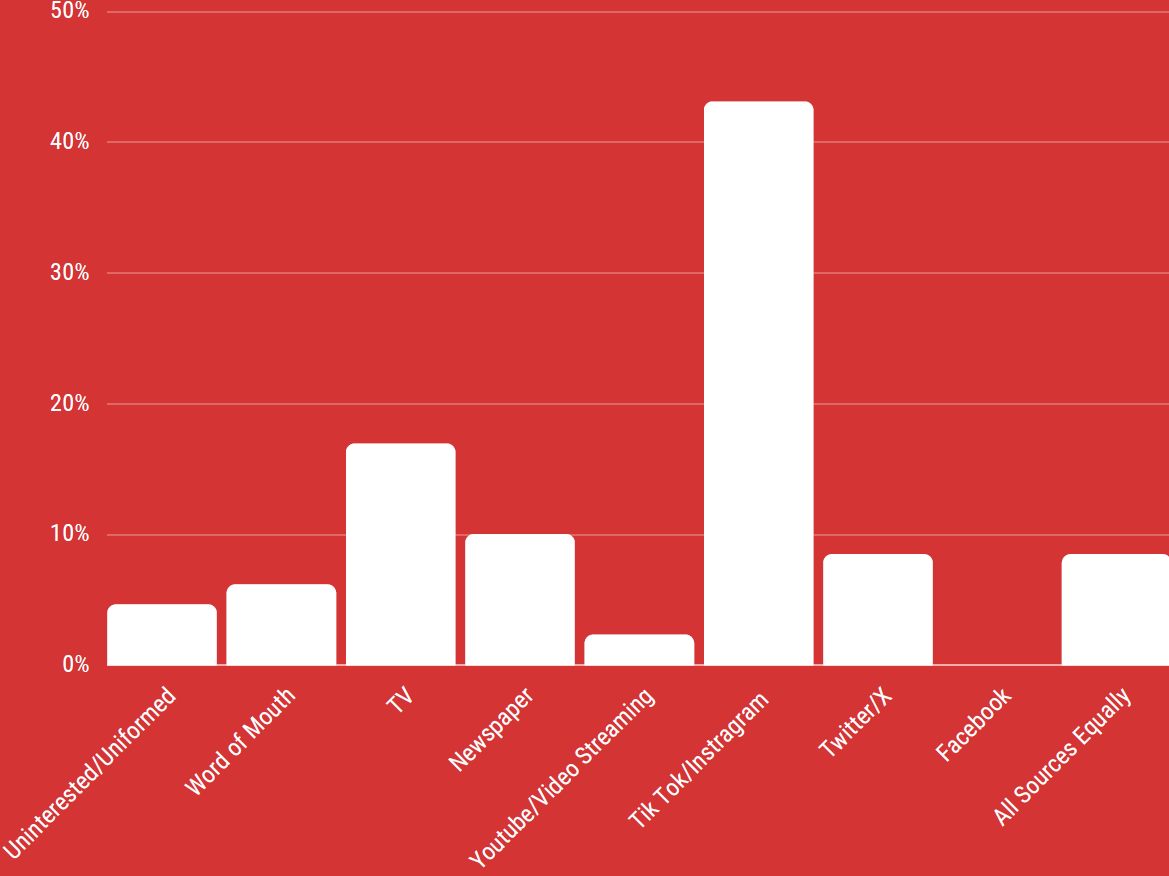Information Overload: News Consumption in the Modern Age
Image of data collection from students social media consumption. By Liam McHugh
From technologies like cuneiform tablets, the printing press and analog technology, the internet was born. It was 33 years ago when the “computer age” era began. While this may sound great for entertainment, many have attested that this has been terrible for journalism and bringing information to the public, especially concerning complex political issues. With so many avenues now for information, which ones can we trust?
Before we can answer that, though, we need to first establish where people — particularly in the Gen-Z demographic — stand. So, off I went to to collect data!
If you want the short answer to where Gen-Z is consuming information, it's from social media; however, the number of answers for social media sites shocked me.
For my research, I asked 130 people where they get their political news from. In the data set, I separated each answer into nine different categories: Uninterest/uninformed, word of mouth, TV, Newspapers, Youtube/other video streaming, TikTok/Instagram, Twitter, Facebook, and one for if they look at each source in equal amounts. The most common response was TikTok/Instagram, with 56 answers or 43.08%. Unsurprisingly, our social media-fueled generation gets most of their information, political or not, from the “doom scrolling” app TikTok and the often vanity-filled app that is Instagram. The second-place choice was surprising, as TV earned 22 votes or 16.92%. When people answered this question, they opted to tell which news channel they watched, stating either CNN or Fox News, two diametrically opposed news channels in terms of political ideology. Like TikTok and Instagram, there is an almost passive nature to consuming media in these forms. The only difference is that Instagram and TikTok have comment feeds allowing for some limited form of “debate,” or rather ‘digital shouting matches.’
Despite this data, you may still be curious: why should we care about this? Isn’t it our right to consume media however we want or don’t want? And, what does it matter where you get the information? Isn’t it good to at least be informed of the issues?
To answer these questions, let me ask you, reader, my own question. Is it not true that these sites and apps work via algorithms? Don’t these algorithms cater content to your specific interests? Don’t these sites tend to be short-form in their types of content? And finally, isn’t politics a complex web of context and cause and effect?
What I’m getting at with this is to show that you are not really the one in control, nor are you truly trying to understand the meat of the issues. Algorithms are the backbone of most, if not all, social media sites nowadays. The way it works is simple: the more you search for and watch certain types of content, the more the site thinks you will enjoy similar things. This creates echo chambers where everybody agrees, and those who disagree are pushed out and shunned for it.
The most damaging thing of all is the fact that these posts are short-form. Politics are complex and have many moving parts that must be understood to get the whole picture. However, this is different from what short-form content caters to. Instead, it oversimplifies and may, at times, be heavily biased. At times, there is a lack of nuance and critical thinking in this style of content. It tells you what to think and how to think when news should just give the facts and leave you room for coming up with your own conclusions.
But there may be a solution to the madness. For one, we could create a social media app that includes all the categories I tested for. This would give a more nuanced look at the issues from both sides and multiple accounts. Another solution is to promote and advocate for people to take a more nuanced and politically unbiased look at political issues through media literacy and by helping people get out of their ideological comfort zone. This is the nature of the debate, something that our founders hoped Americans would engage more in, not spitting matches, but rather accurate and respectful dialogues.
But I have one more solution up my sleeve: leave social media for entertainment and the news for news.
